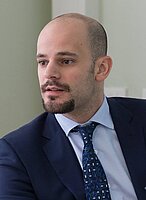
MA, University of Toronto
Ph.D. Candidate, University of Tartu
ORCID
LinkedIn
Researchgate
Academia.edu
Estonian Scientific Information System (ETIS)
Lecturer in International Relations, Department of Political and Strategic Studies, Baltic Defence College
Junior Research Fellow in Comparative Politics, Johan Skytte Institute of Political Studies, University of Tartu
Lecturer in Political Science, University of Latvia, Faculty of Social Sciences, Department of Political Science
Louis Wierenga received his MA from the University of Toronto’s Munk School of Global Affairs in 2014. He is currently a Lecturer in International Relations at the Baltic Defence College, a Junior Research Fellow in Comparative Politics at the Johan Skytte Institute of Political Studies, University of Tartu, and a lecturer in political science at the Faculty of Social Sciences, University of Latvia. Previously he has held guest fellowships at Uppsala University’s IRES (Institute for Russian and Eurasian Studies), Sodertorn University’s Department of Political Science; and with the Chair of Comparative Politics at European University Viadrina Frankfurt (Oder). Louis has also held a guest lecturer position at the Tallinn University of Technology (TalTech).
Louis’s research interest include populist radical right parties - specifically leadership and party structure, social media and discursive opportunity structures, youth organizations, transnational networks, foreign policy, and social movement parties and metapolitical actors and their engagements between ideology and party structures. He also focuses on the politics of the Baltic states; information warfare and cyber ops; and the contemporary security environment – changes, challenges, and the major drivers and trends of international security. Louis also serves as a POLAD (political advisor) for scenario-based joint exercises.
He has successfully completed a Horizon 2020 project, “Populist rebellion against modernity in 21st-century Eastern Europe: neo-traditionalism and neo-feudalism “ with a work package focusing on populism and the populist radical right in the Baltic states.
Currently, Louis is part of a project entitled, “Making Tomorrow’s Leaders” which is a Swedish Research Council project analyzing youth organizations of far-right parties. He is also currently part of a consortium analyzing multilateralism through technology, which has been submitted as a Horizon Europe application.
Docētie studiju kursi
- PolZ2053 : Populisms un radikāli labējais populisms Eiropā
- PolZ1092 : Sociālie mediji un digitālais laikmets 21. gadsimtā
Jaunākās publikācijas
- Kasekamp, Andres. Mari-Liis Madisson, and Louis Wierenga. 2019. Discursive Opportunities for the Estonian Populist Radical Right in a Digital Society. Problems of Post-Communism, 66:1, 47-58.
- Petsinis, Vassilis, and Louis Wierenga (2021). Report on radical right populism in Estonia and Latvia. Populist rebellion against modernity in 21st-century Eastern Europe: neo-traditionalism and neo-feudalism, POPREBEL Working Paper Series.
- Wierenga, Louis. (2017). Russians, Refugees, and Europeans: What Shapes the Discourse of the Conservative People’s Party of Estonia, Humanities and Social Sciences Latvia, 25:1, 4-19.
- Wierenga, Louis (2019). Bauska's Chairmen: Party Leadership and Twitter Engagement in Estonian and Latvian Populist Far-Right Parties, Polish Political Science Review, 7:1, 138-154.
- Wierenga, Louis. (2022). Cybersecurity and Hybrid Threats in the Digital Baltic States: A State of the Art. In Sprūds, A.; Bērziņa-Čerenkova, U.; Broka, S. (Eds). Hybrid Threats in Baltics and Taiwan: Commonalities, Risks and Lessons for Small Democracies. Publisher: Latvian Institute of International Affairs.
Pētniecības tēmas
- Populist radical right parties:
- Leadership and party structure
- Social media and discursive opportunity structures
- Youth organizations
- Transnational networks - social movement parties and metapolitical actors and their engagements between ideology and party structures
- Foreign policy
- The politics of the Baltic states
- Information warfare and cyber ops
- The contemporary security environment – changes, challenges, and the major drivers and trends of international security
- Social media, technology, and political impact

 Academic Centre
Academic Centre